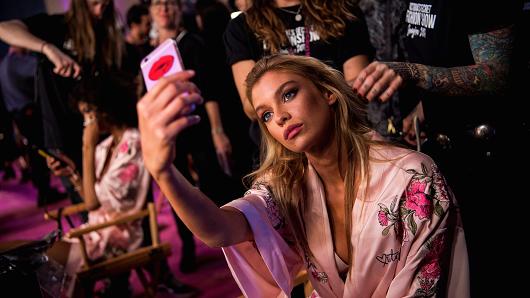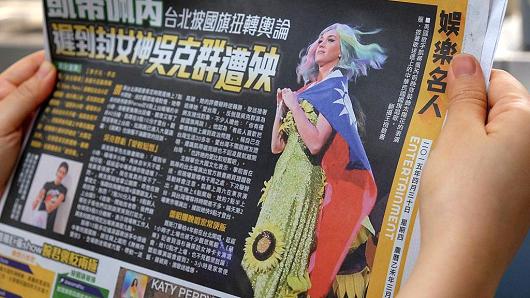
- Women’s clothing brand Victoria’s Secret has wrapped its first ever fashion show in China
- Katy Perry and supermodel Gigi Hadid, who were expected at the event, did not attend due to reported visa issues
- An editorial about the event published by Chinese state-run newspaper the Global Times said that “Political correctness cannot be ignored” by international celebrities

Women’s clothing brand Victoria’s Secret has wrapped its first ever fashion show in China, although the brand’s move east has not been without its issues.
Its annual show was held in Shanghai this year, but politics in the region caused problems for the event organizers. Katy Perry, who was expected to perform, was reportedly denied visa entry for wearing a sunflower-adorned dress while performing in Taiwan back in 2015. The flower is the emblem of the island’s anti-China movement.
Meanwhile, supermodel Gigi Hadid announced via Twitter last week that she would not be taking part in the show. Reports have attributed this to a video made public earlier this year in which Hadid apparently squinted her eyes. The video, perceived as politically insensitive, has since been taken down and Hadid apologized for how it may have been construed.
Model Stella Maxwell takes a selfie backstage before the start of the 2017 Victoria’s Secret Fashion Show in Shanghai, China, on November 20, 2017.
Fred Dufour | AFP | Getty Images
Model Stella Maxwell takes a selfie backstage before the start of the 2017 Victoria’s Secret Fashion Show in Shanghai, China, on November 20, 2017.
Women’s clothing brand Victoria’s Secret has wrapped its first ever fashion show in China, although the brand’s move east has not been without its issues.Its annual show was held in Shanghai this year, but politics in the region caused problems for the event organizers. Katy Perry, who was expected to perform, was reportedly denied visa entry for wearing a sunflower-adorned dress while performing in Taiwan back in 2015. The flower is the emblem of the island’s anti-China movement.
Meanwhile, supermodel Gigi Hadid announced via Twitter last week that she would not be taking part in the show. Reports have attributed this to a video made public earlier this year in which Hadid apparently squinted her eyes. The video, perceived as politically insensitive, has since been taken down and Hadid apologized for how it may have been construed.
An editorial published Monday by the Global Times, a state-run newspaper in China, said that while the two stars’ reasons for not participating were “unknown,” it was “logical” that both were denied visas for political reasons.
“Political correctness cannot be ignored,” said the editorial.
“Payback was unavoidable,” it went on. “Those who are serious about developing careers in the Chinese market can draw lessons from this case and learn to abide by the rules in China.”
Reports have also surfaced that other models and influencers were denied entry to the country.
Victoria’s Secret did not respond to CNBC’s request for comment.
Popular Western performers have been denied entry to China before, including Justin Bieber and Maroon 5, the latter supposedly for one member tweeting birthday wishes to the Dalai Lama.
 In this photo taken on April 30, 2015, a local resident reads a newspaper showing U.S. singer Katy Perry wearing Taiwan’s national flag in the capital Taipei.
In this photo taken on April 30, 2015, a local resident reads a newspaper showing U.S. singer Katy Perry wearing Taiwan’s national flag in the capital Taipei.Victoria’s Secret opened a flagship store in Shanghai in February of this year. Its annual fashion show is touted as the most expensive in the world, with Ed Razek, the show’s executive producer, telling the New York Times that 2016’s event cost $20 million. The show features diamond and Swarovski-adorned costumes, and this year includes a collaboration with French fashion label Balmain.
The big-spending strategy could resonate well in the Chinese marketplace. Anusha Couttigane, senior fashion analyst at consultancy firm Kantar Retail, told CNBC that in order to capture Chinese shoppers’ attention, “it is essential (for brands) to have some fanfare as Chinese consumers tend to be responsive to grand, high profile showcases.”
The Chinese underwear market was worth 144.4 billion yuan ($21.8 billion) in 2016, according to the Hong Kong Trade Development Council.
Matthew Crabbe, director of research for Asia-Pacific at Mintel, told CNBC that “Chinese consumers are receptive to foreign brands that ooze quality and cachet. They are increasingly wealthy, and can therefore afford to buy such brands. They are also increasingly well-traveled, and therefore exposed to more foreign brands.”
But for Victoria’s Secret and other such international players keen to tap into the Chinese market, “the old caveats remain,” Crabbe said. “Foreign brands have to do their homework.
courtesy=cnbc.com

